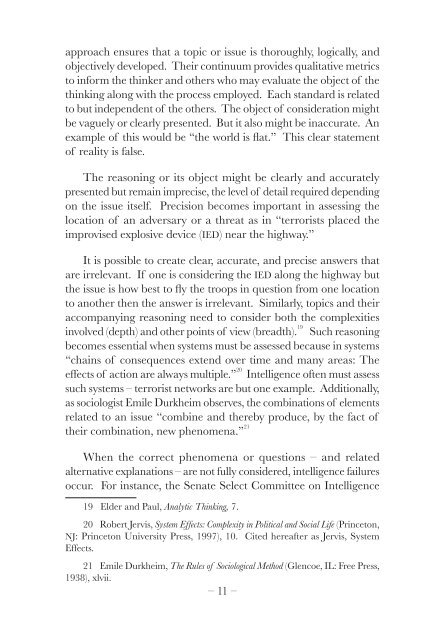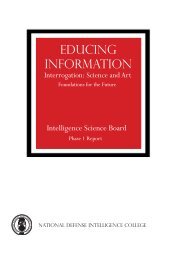Critical Thinking and Intelligence Analysis
Critical Thinking and Intelligence Analysis
Critical Thinking and Intelligence Analysis
You also want an ePaper? Increase the reach of your titles
YUMPU automatically turns print PDFs into web optimized ePapers that Google loves.
approach ensures that a topic or issue is thoroughly, logically, <strong>and</strong><br />
objectively developed. Their continuum provides qualitative metrics<br />
to inform the thinker <strong>and</strong> others who may evaluate the object of the<br />
thinking along with the process employed. Each st<strong>and</strong>ard is related<br />
to but independent of the others. The object of consideration might<br />
be vaguely or clearly presented. But it also might be inaccurate. An<br />
example of this would be “the world is flat.” This clear statement<br />
of reality is false.<br />
The reasoning or its object might be clearly <strong>and</strong> accurately<br />
presented but remain imprecise, the level of detail required depending<br />
on the issue itself. Precision becomes important in assessing the<br />
location of an adversary or a threat as in “terrorists placed the<br />
improvised explosive device (IED) near the highway.”<br />
It is possible to create clear, accurate, <strong>and</strong> precise answers that<br />
are irrelevant. If one is considering the IED along the highway but<br />
the issue is how best to fly the troops in question from one location<br />
to another then the answer is irrelevant. Similarly, topics <strong>and</strong> their<br />
accompanying reasoning need to consider both the complexities<br />
involved (depth) <strong>and</strong> other points of view (breadth). 19<br />
Such reasoning<br />
becomes essential when systems must be assessed because in systems<br />
“chains of consequences extend over time <strong>and</strong> many areas: The<br />
effects of action are always multiple.” 20<br />
<strong>Intelligence</strong> often must assess<br />
such systems – terrorist networks are but one example. Additionally,<br />
as sociologist Emile Durkheim observes, the combinations of elements<br />
related to an issue “combine <strong>and</strong> thereby produce, by the fact of<br />
their combination, new phenomena.” 21<br />
When the correct phenomena or questions – <strong>and</strong> related<br />
alternative explanations – are not fully considered, intelligence failures<br />
occur. For instance, the Senate Select Committee on <strong>Intelligence</strong><br />
19 Elder <strong>and</strong> Paul, Analytic <strong>Thinking</strong>, 7.<br />
20 Robert Jervis, System Effects: Complexity in Political <strong>and</strong> Social Life (Princeton,<br />
NJ: Princeton University Press, 1997), 10. Cited hereafter as Jervis, System<br />
Effects.<br />
21 Emile Durkheim, The Rules of Sociological Method (Glencoe, IL: Free Press,<br />
1938), xlvii.<br />
– 11 –
















